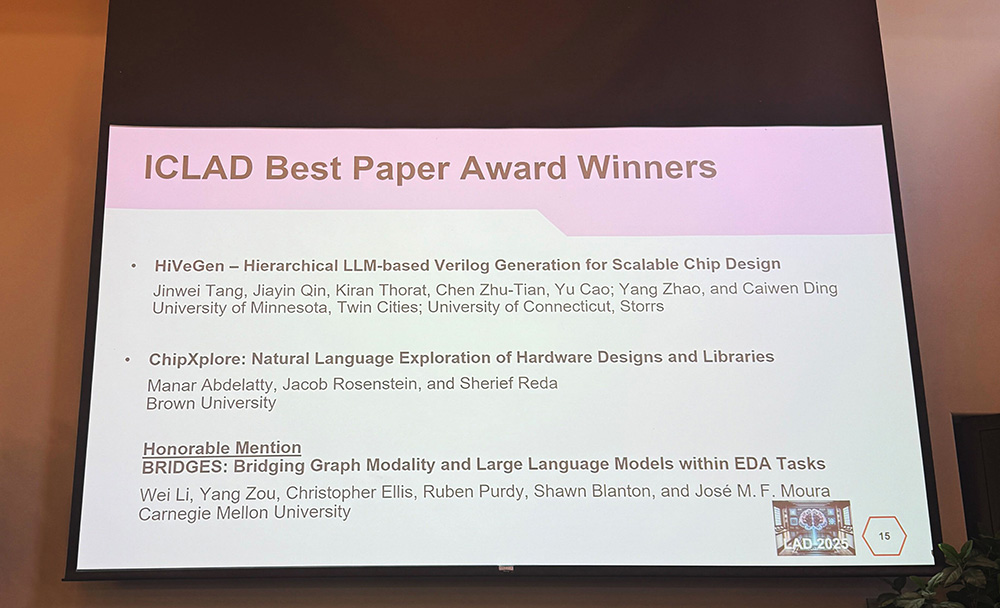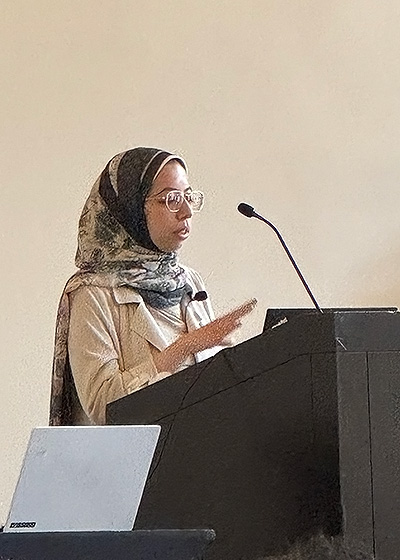 Fourth-year Brown Engineering Ph.D. student Manar Abdelatty won a Best Paper award at the second annual IEEE (Institute of Electrical and Electronics Engineers) International Conference on LLM (Large Language Model)-Aided Design in June. The paper, ChipXplore: Natural Language Exploration of Hardware Designs and Libraries, was co-authored by Professor Sherief Reda and Associate Professor Jacob Rosenstein, both advisors of Abdelatty in her doctoral studies. Abdelatty presented the paper at the 2025 conference, and was rewarded with a 5080 NVIDIA GPU.
Fourth-year Brown Engineering Ph.D. student Manar Abdelatty won a Best Paper award at the second annual IEEE (Institute of Electrical and Electronics Engineers) International Conference on LLM (Large Language Model)-Aided Design in June. The paper, ChipXplore: Natural Language Exploration of Hardware Designs and Libraries, was co-authored by Professor Sherief Reda and Associate Professor Jacob Rosenstein, both advisors of Abdelatty in her doctoral studies. Abdelatty presented the paper at the 2025 conference, and was rewarded with a 5080 NVIDIA GPU.
Designing computer chips is incredibly complex. Engineers must choose from thousands of different building blocks (called “cells”) provided by chip manufacturing companies. Each building block has hundreds of different specifications - like how fast it operates, how much power it uses, and how much space it takes up. Currently, engineers have to manually search through all these options to find the right components for their designs, which is slow and mistake-prone.
 To address this, Brown researchers developed ChipXplore, an LLM-assisted framework that lets engineers ask questions about chip designs using everyday language instead of complex technical searches. ChipXplore acts like an intelligent assistant that can understand questions like “Which components would make my chip run fastest?” or “What parts use the least power?” The system then automatically searches through massive databases of chip components and provides the best answers. The key innovation is that ChipXplore understands the specific way chip design information is organized and can search multiple databases simultaneously to evaluate different tradeoffs in speed, area, and power.
To address this, Brown researchers developed ChipXplore, an LLM-assisted framework that lets engineers ask questions about chip designs using everyday language instead of complex technical searches. ChipXplore acts like an intelligent assistant that can understand questions like “Which components would make my chip run fastest?” or “What parts use the least power?” The system then automatically searches through massive databases of chip components and provides the best answers. The key innovation is that ChipXplore understands the specific way chip design information is organized and can search multiple databases simultaneously to evaluate different tradeoffs in speed, area, and power.
This research represents a major step toward fully automated chip design assistants. The system builds the foundation for AI systems that require hardware design and library awareness.
The 2025 IEEE International Conference on LLM-Aided Design, held at Stanford University, focused on how to use LLM technology to help design circuits, software, and computing systems with improved quality, productivity, robustness, and cost. It was the first international conference dedicated to this topic, aiming to showcase results that leverage generative-AI advances and provide new methods and solutions for design automation, software development, and other fields.